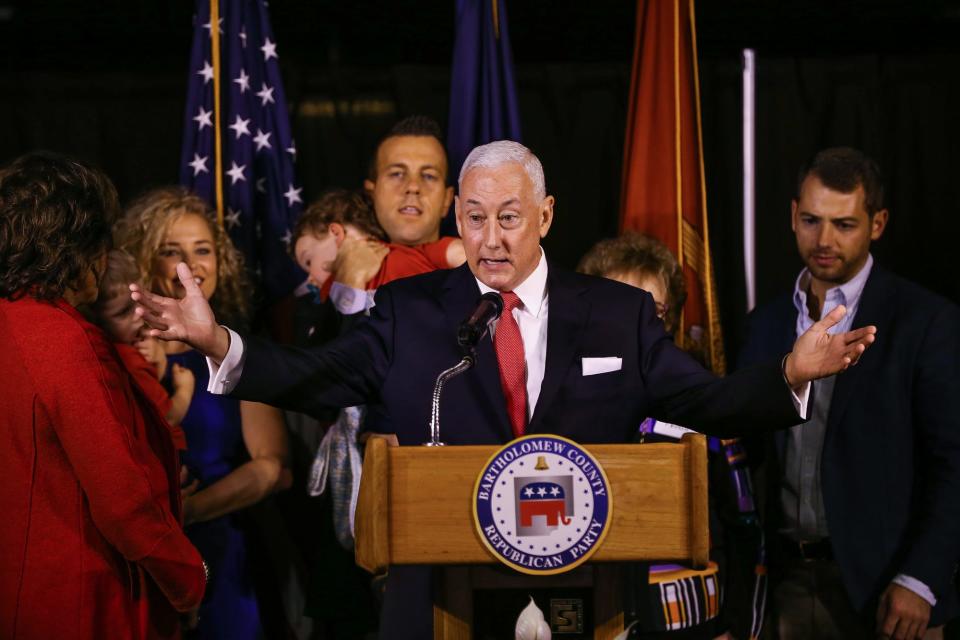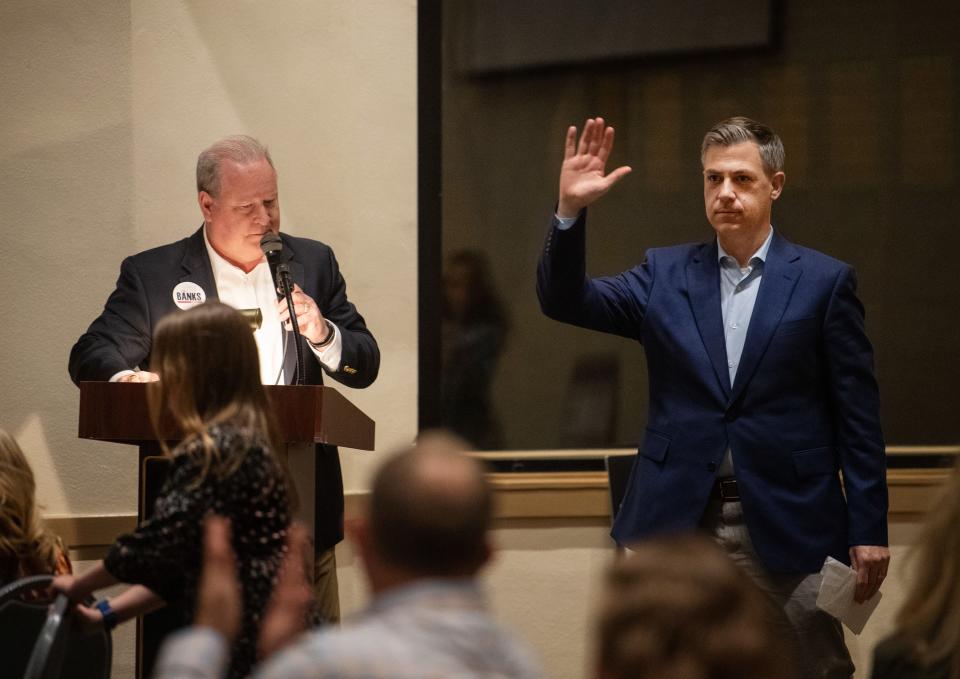Why Indiana has 4 open U.S. House seats heading into 2024 elections
The mid-January week that Republican Indiana U.S. Reps. Larry Bucshon and Greg Pence announced plans to not seek reelection to Congress, the House was once again in disarray.
Far-right House members objected to a $1.59 trillion spending deal that Republican Speaker Mike Johnson made with Democratic Senate Majority Leader Chuck Schumer in an attempt to avert another government shutdown, the third such deadline federal lawmakers have faced in less than six months.
That debate mirrored a tumultuous 2023 in Washington D.C. in which the House saw multiple votes and candidates for Speaker after Florida Republican Rep. Matt Gaetz initiated a process to oust former California Rep. Kevin McCarthy from the chamber’s leadership role.

Given the turmoil, it’s not surprising that incumbent members of Indiana’s congressional delegation in fairly safe Republican House districts would choose not to run for another term in a major election year, political science experts told IndyStar.
“The House is not a very happy place to work in because it simply isn't working at all,” said Marjorie Hershey, professor emeritus of political science at Indiana University. “The current U.S. House has passed fewer pieces of legislation this past year than has any House in recent memory and most of those have been very minor.”
The now four open U.S. House seats in Indiana could drain the state's power in Congress, experts said, as Bucshon and Pence sit on the influential House Committee on Energy and Commerce. Additionally, the latest politicians to announce their intent not to run — Bucshon and Pence — did so days before the filing period for the 2024 primary elections opened on January 10.
Why working in Congress can be difficult
Four vacancies among the nine Hoosiers in the U.S. House will likely translate into a loss of institutional knowledge, especially for Republicans, said Mike Wolf, the acting director of the Mike Downs Center for Indiana Politics.
Bucshon and Pence join Rep. Jim Banks, who is running for U.S. Senate, and possibly Rep. Victoria Spartz in leaving the House. In 2023 Spartz said she would not seek reelection, but she recently told IndyStar she might reconsider that decision.
Bucshon was elected in 2010, Banks in 2016, Pence in 2018 and Spartz in 2020.
The tenure of those members and their roles in committees likely have built connections that may have benefitted Hoosiers over the years, Wolf said.
"These kind of longer term relationships between the executive branch and different advocacy groups and interest groups, and members of Congress tend to bring advantages when it comes to receiving grants," Wolf said.

There are challenges in working in Congress that can make the job difficult, including the current “mood of the institution” during a major election year where Republicans could either maintain or lose their majority in the House, Wolf said.
Republicans currently hold a 220-213 majority over Democrats in the House with two outstanding vacancies heading into 2024 races. In 2022 Republicans won a majority in the House, but not to the extent expected during a midterm year where voters often cast their ballots against the President's party. By contrast, in 2018 during former President Donald Trump's tenure, Democrats won a 235-199 majority.
Because primary elections currently determine many Congressional seats, these contests have become races to the far-right for Republican candidates and the far-left for Democrats to appeal to outside voters in each party, said Mark Harkins, a senior fellow with the Government Affairs Institute at Georgetown University.
Those candidates arrive in Washington D.C. without a majority in line with more extreme policy views that can make it hard to accomplish their priorities. That leads to frustration across the board, Harkins said.
“If you're a very conservative Republican in the House right now you're extraordinarily frustrated because you feel like your own party isn't willing to go as far as you think they ought to go,” Harkins said.
Spartz has demonstrated that perspective. In 2023, the Noblesville congresswoman threatened to quit Congress over the lack of a debt commission to study the national debt. Spartz this month reintroduced another version of a bill to establish that commission.
2024 Elections
The four open congressional elections this year all sit in fairly safe Republican districts, said Wolf of the Downs Center.
The Indiana General Assembly in 2021 went through redistricting following the results of the last census, which allowed Republicans to safely maintain seven of the state’s nine House districts. The 5th Congressional District, especially, moved farther into Republican hands after Spartz won a close race in 2020.
Republican candidates are already lining up for those four open seats. As of Jan. 16, state Sen. Andy Zay, R-Huntington, and Mike Felker filed to run for the 3rd Congressional District. State Rep. Chuck Goodrich, R-Noblesville, Max Engling and Patrick Malayter filed to run for the 5th Congressional District. State Rep. Mike Speedy, R-Indianapolis, and Nathan Swain filed for the 6th Congressional District.
From 2021: Indiana Republicans' proposed redistricting map keeps Victoria Spartz's seat safe
Indiana Democratic Party Chair Mike Schmuhl said he is open with potential candidates about the challenges they might face in Republican-leaning districts. The two Democratic incumbents, U.S. Reps. Andre Carson and Frank Mrvan, have already filed to run for reelection this year and, as of Jan. 16, Republican candidates have filed for primaries in those districts.
Schmuhl said his party welcomes the opportunities that come for Democrats with open seats and he spoke with interested candidates following the Bucshon and Pence announcements. Just this week, Democrat Cynthia Wirthe filed to run for the 6th Congressional District.
“I think it allows us as a party to recruit better candidates who might otherwise not take a look at it, who might not want to challenge their incumbent member of Congress who has been serving for a number of years and take them on with their name ID and their war chest,” Schmuhl said.
But Republicans are confident in the candidates running for Congressional seats, Indiana Republican Party chairwoman Anne Hathaway said.
“We have been fortunate to enjoy years of impactful leadership from our Republican members of Congress,” Hathaway said in a statement to IndyStar. “The Indiana GOP has a very deep bench of Republicans ready to step into these roles, represent these districts and continue fighting for our Hoosier values.”
Contact IndyStar's state government and politics reporter Brittany Carloni at [email protected] or 317-779-4468. Follow her on Twitter/X @CarloniBrittany.
This article originally appeared on Indianapolis Star: 2024 Election: Why Indiana has 4 open U.S. House seats and who may run